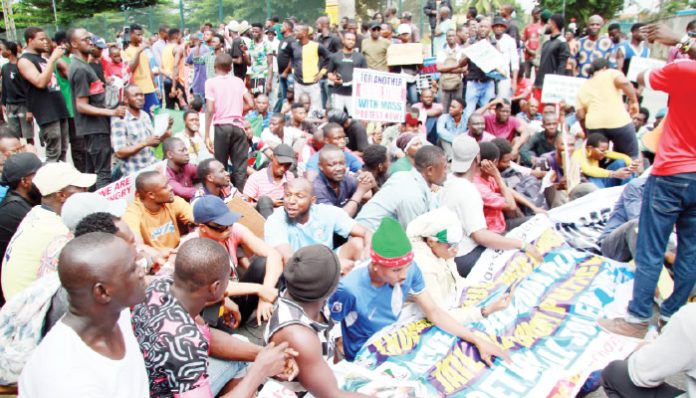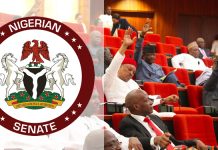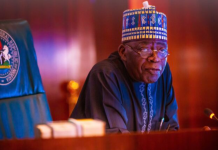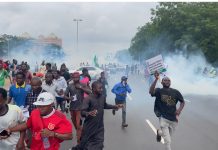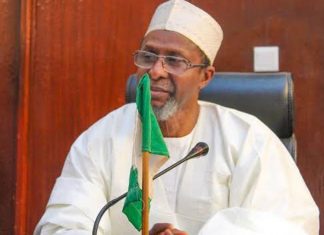

As the ‘End Bad Governance’ protests began on Thursday with some citizens reportedly killed, LAOLU AFOLABI examines the history of protests in Nigeria and their impacts, from the Aba Women’s Riot to #EndSARS protests, and how they have disrupted the economy and forced policy changes
The country woke up to a fresh round of nationwide protests on Thursday. Nigerians’ anger and frustration had reached a boiling point. The root causes of the planned protest are multifaceted, including economic hardship, government corruption, and perceived inefficiencies in leadership. In addition to financial woes, systemic corruption within various levels of government has eroded public trust. Nigerians are increasingly disillusioned with leaders who they feel are more interested in self-enrichment than in addressing the needs of the populace.
The administration of President Bola Tinubu came into office on May 29, 2023, amid expectations. Nigerians believed the new government would bring a wave of relief and lessen the burdens of the past administration led by Major-General Muhammadu Buhari (retd.).
His first strike, however, showed the administration would go for hard decisions.
“Subsidy is gone,” he announced while veering off his inaugural speech. However, the President’s removal of petrol subsidies exacerbated the economic burden on citizens, leading to skyrocketing prices for essential goods and services. This situation has left many struggling to make ends meet, fueling widespread discontent.
The protests are not only a reaction to immediate economic pressures but also a manifestation of long-standing grievances. Issues such as police brutality, inadequate public services, and poor infrastructure have been simmering for years. Movements like #EndSARS, which emerged in 2020 to combat police violence, highlight the persistent demand for justice and systemic change.
Protests have played a significant role in Nigeria’s history, reflecting the country’s diverse social, political, and economic challenges. From the Aba Women’s riot in 1929 to the Naira Redesign protest of 2023, Nigerians have shown resilience in the face of adversity and their unwavering commitment to advocating for their rights and a better future
In the Aba Women’s Riot in December 1929, there was a major revolt by women in southeastern Nigeria against British colonial rule. The women protested against the imposition of taxes and oppressive policies of the colonial administration. In the end, about 50 women reportedly died with many others assaulted.
In November 1947, there was the Abeokuta Women’s Revolt, another significant protest by women in the present-day capital of Ogun State against colonial authorities and local leadership, primarily over unfair taxes. The earlier protests were led by women, notable among them was Funmilayo Ransome-Kuti, mother of legendary musician Fela Anikulapo-Kuti.
In April 1978, youths took up the challenge, leading the ‘Ali Must Go’ nationwide protest. University students protested against the tuition increase believed to have been introduced by the then-Minister of Education, Col. Ahmadu Ali, leading to widespread demonstrations and confrontations with security forces. Ali was appointed Minister of Education by three consecutive Heads of State: Yakubu Gowon, Murtala Mohammed and Olusegun Obasanjo, was believed to be at the centre of the uprising, but he tried to shift responsibility, citing that the increment was made by the Supreme Military Council and not the Ministry of Education.
The then-Secretary of the Nigerian University Commission, Dr Jibril Aminu, had revealed that school fees of tertiary institutions would be increased due to the high cost of living in the country. The hostel fee was increased to N90 per student per session for 36 weeks. The cost of meal tickets was also hiked from N1.50k to N2.00. A former President of the National Union of Nigerian Students, Segun Okeowo (now late), led students in the series of protests. On the second day, there was a battle between the students and the Nigerian Police at the University of Lagos. A student was shot in the leg and bled to death. The protests became intensive and about eight students were killed in Zaria by soldiers. The development led to the closure of all universities by the Federal Military Government. At the end of the protests, the government did not reverse the fees.
On May 24, 1989, protests against the Structural Adjustment Programme implemented by the Ibrahim Babangida administration began. The protest involved students, labour unions, even the unemployed and the hoodlums. The International Monetary Fund-imposed SAP was introduced as a government policy in 1986 in an attempt to stop the effects of falling oil prices and foster the development of local industries. The measures were to ensure that Nigeria qualified for IMF-issued loans. Nigerians had to leave home earlier than usual for their daily commute due to a collapse in the transportation system and had to be content with a single meal per day.
As the hardships bit harder, the Nigerian National Petroleum Corporation announced an increase of N2.50 in the cost of petroleum products, leading to an increase in food prices and transportation costs. The students initiated the crisis and it eventually spread beyond the university community. Consequently, there was widespread destruction of state-owned property.
Following the protest, a SAP relief package was designed for the masses and proved successful in dousing the agitations. The components of the package included the creation of 62,000 jobs as unemployed graduates were instructed to report to ministries for prompt employment and funds were made available for the employment of teachers. Feeding programmes for the poor and transport relief packages were also created. Import duties on vehicles and vehicle spare parts were removed in the wake of the riots. Students were given N500 bursaries to cope with the effects. It is estimated that about $1bn was spent on the SAP relief measures.
There were again massive protests across the country in 1993, following the annulment of the presidential election by the Bbangida-led administration. The election was held on June 12, 1993, the first since the 1983 military coup, which ended the country’s Second Republic. The unofficial result of the election – though not declared by the National Electoral Commission – indicated a victory for MKO Abiola of the Social Democratic Party, who defeated Bashir Tofa of the National Republican Convention. The winner was never declared as the elections were annulled by Babangida, citing electoral irregularities. The annulment led to protests and political unrest, including the resignation of Babangida and a handover to the interim national government. There was a military takeover by Sani Abacha via a bloodless coup later in the year. The protests continued using international organisations and the media until the return to democracy in 1999.
On January 2, 2012, another round of protests began. It was tagged ‘Occupy Nigeria.’ The movement began a socio-political protest on Monday, January 2, 2012, following the fuel subsidy removal by the Federal Government led by ex-President Goodluck Jonathan on January 1, 2012. The Federal Government had announced the removal of fuel subsidy on January 1 and without notice, Occupy Nigeria organisers took to the streets by January 2. The Minister of Finance, Ngozi Okonjo-Iweala, had championed the decision and the citizens got no prior warning. The government argued that the removal of the heavy subsidy would free up funds for other public services, including health and infrastructure projects, and that the liberalisation of the fuel industry would benefit the economy.
From N65 per litre, the petrol pump price rose to N141 immediately after the subsidy removal. This was followed by a quick rise in consumer prices. Bus fares doubled and food prices also rose to as much as two times their original cost. Demonstrations against the removal of the fuel subsidy began on January 2 in Lagos, Abuja and Kano. By January 6, the protests had taken place in every major Nigerian city, with nearly all economic activities stopped in Lagos, Ibadan, and Kano.
The protests were led by notable Nigerians, and human rights activists, including members of the opposition political parties, led by now-President Bola Tinubu. In Lagos, some policemen even joined the protesters. The Nigeria Labour Congress and the Trade Union Congress called for a national strike beginning January 9. The Nigerian Medical Association and the Nigerian Bar Association offered their support to the strike, as did several other unions. By January 9, the general strike began, with oil and gas workers joining. A total of 11 protesters had been killed by security forces at this point.
President Jonathan limited the damage in the face of growing pressure as he announced a panel to oversee the funds freed up by the removal of the fuel subsidy. He announced a 25 per cent reduction in all government salaries and promised an increased number of buses to reduce transportation costs. By January 16, Jonathan bowed to pressure by partially reinstating the fuel subsidy and the price of fuel fell to N97 per litre, which was substantially lesser than the N141 after subsidy was removed, though it didn’t revert to the original price of N65.
The EndSARS protest of October 2020 remains fresh in memory. It was a major protest movement against police brutality, specifically targeting the Special Anti-Robbery Squad. It grew into a broader movement against systemic corruption and bad governance. On Thursday, October 8, 2020, the nationwide protests on ENDSARS started after weeks of outrage and anger with videos and pictures showing police brutality, harassment and extortion in Nigeria. The protests were led predominantly by young Nigerians in different cities alongside many activists and celebrities.
The hashtag #EndSARS accumulated over 28 million tweets on Twitter (now X) alone. Solidarity protests and demonstrations by Nigerians in the diaspora and sympathisers occurred in many major cities around the world. On October 11, 2020, the Nigeria Police Force announced the dissolution of the unit with immediate effect. The move was widely perceived as a triumph for the demonstrators. However, it was noted in many quarters that similar announcements had been made in recent years to placate the public without the unit being disbanded, and that the government had merely planned to reassign and review SARS officers to medical centres rather than disband the unit entirely. Protests continued accordingly, and the Nigerian government maintained a pattern of violent repression, including the killing of demonstrators. International demonstrations in solidarity with those in the country followed and the movement also grew increasingly critical of Muhammadu Buhari’s government’s response to the protests.
On Sunday, October 11, 2020, the protestors made a list of five demands to be met by the Federal Government. The demands, which were signed by a group called ‘A Nigerian Youth’, asked for the immediate release of everyone arrested during the protests as well as justice and compensation for all who died through police brutality in Nigeria. They also demanded that an independent body be set up within 10 days to investigate and prosecute all reports of police misconduct. They asked for the psychological evaluation and retraining of SARS operatives before their redeployment. Lastly, they asked for an adequate increase in the salaries for officers of the Nigerian police.
In response to the public outcry, the Inspector-General of the Nigeria Police banned the FSARS, Special Tactical Squad, Intelligence Response Team, Anti-Cultism Squad and other tactical units from mounting roadblocks, checkpoints, stop-and-search and other routine patrols.
On October 19, 2020, President Muhammadu Buhari reacted to the continuation of the movement by warning young Nigerians of anarchists who were allegedly attempting to hijack the protests and stated that the Federal Government “would not tolerate anarchy in the country.”
On Tuesday, October 20, 2020, the Central Bank of Nigeria and its governor, Godwin Emefiele, obtained an ex parte motion to freeze the accounts of notable participants in the End SARS protest. By the evening of October 20, a clip of the shooting of Nigerian youths at Lekki Toll Gate, videoed by one DJ Switch, trended on the Internet, showing how live rounds of bullets were being shot at innocent protesters who crouched on the ground, holding hands together and singing the National Anthem. There were also reports that at least 50 other people were injured. This generated outrage and the protest grew wild the next day. Lagos suffered the brunt, with many BRT buses burnt, the Igbosere court burnt and media houses TVC and the Nation headquarters, among many others, were touched by the mob.
Just like the hardship of 2012 after the removal of fuel subsidies, Nigerians again lamented that the economy was taking effect on their living. Not able to bear the hardship anymore, they scheduled the protest to end bad governance and economic mismanagement for August 1 (today).
While preparing for the protest, the police, through the X handle, @PoliceNG, on Wednesday, wrote, “Hello, good morning! It’s the last day of the month of July. We hope for a more fulfilling August. And…if you must protest, do so peacefully. Be watchful and vigilant. Our history is littered with ugly experiences of protests that turned violent. We certainly can’t have a repeat. Not at these fragile moments!”
Govt action to thwart protests
As protesters were hell-bent on embarking on the protest today, the Federal Government took some economic initiatives to stop the plan. In the week, the President met with traditional rulers, religious leaders, and political leaders, including governors and a diverse group of Nigerians, stating his reasons for the economic initiatives, with a call on Nigerians to exercise restraint.
On Monday, after the Federal Executive Council meeting, the Federal Government announced the sale of a 50kg bag of rice, which hitherto sold for N80,000, for N40,000 at designated centres across the country. Also at the FEC meeting, the President doused the tension surrounding the Dangote Refinery as he directed the Nigerian National Petroleum Company Limited to sell crude to the refinery and other refineries in the country in naira.
The President also signed into law the New National Minimum Wage Bill, effecting from May the payment of N70,000 to Nigerian workers. Tinubu also promised that the government would pay the backlog from May to July, as the workers begin to enjoy the enhanced wages from their August salary.
On Tuesday, the Comptroller-General of Customs announced that the government had granted waivers to import food items into the country for 150 days, to ensure food security. Thus, the government suspended import duties on food and other commodities. Also on Tuesday, the Senate President, Godswill Akpabio, announced that the Federal Government would pay 10,000 Niger Delta youths a monthly stipend of N50,000 through the Youth Internship Scheme.
Not done, the Nigerian Educational Loan Fund announced that it had paid the institutional fees for 20,000 students across registered institutions in the country. On Wednesday, the Fund announced the disbursement of an additional N850m for more number of students who had applied for the loan.
The steps taken by the Nigerian government to prevent the planned “End Bad Governance Protests” reflect a multi-faceted approach aimed at addressing economic, social, and political grievances. These measures underscore the government’s commitment to maintaining peace and stability while working to improve the living conditions of its citizens. The effectiveness of these initiatives in preventing the protests and achieving long-term stability remains to be seen.
Join Television Nigerian Whatsapp Now
Join Television Nigerian Facebook Now
Join Television Nigerian Twitter Now
Join Television Nigerian YouTUbe Now

